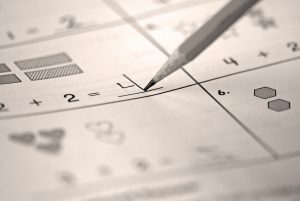1. Mathematical Achievement
Early mathematical skills are considered as a powerful predictor of students’ subsequent mathematical development, as well as their overall academic career. As elementary school students grow up, their ability to compare and order rational numbers, as well as their overall mathematical performance, tends to increase. A critical factor in students’ attitudes toward mathematics is the ability to solve arithmetic problems in the early years of elementary school, where many of the students find it difficult. Inductive reasoning seems to have a statistically significant correlation with mathematics performance and especially problem solving. There are a number of researches that argue that there are cognitive functions that affect math performance in elementary school, such as working memory and attention, as well as executive functions such as inhibition, switching and updating ability. Working memory, as well as the executive functions mentioned above, are strongly related to mental arithmetic skills, that is, solving mentally arithmetic problems, especially in students with high levels of mathematical anxiety. Cognitive processes are even involved in basic arithmetic operations, such as detention and borrowing in addition and subtraction respectively in rational numbers. General cognitive functions, as well as some specific skills such as number comparison, quantification and number sequencing, could predict early mathematical skills. In addition, verbal skills, executive function, family environment and informal math skills could be considered as important predictors of the mathematical performance of primary school students.

2. Cognitive Factors
2.1. Working Memory
Working memory, i.e. the ability to cache and manage data while performing an activity, is considered to be significantly related to mathematical performance. Specifically, the central executive system appears to be related to various skills, such as computing ability, intercept capability and rated speed. The difference in mathematical performance between typically developing children and children with math difficulties is even more pronounced in activities involving working memory. Problem solving, as well as basic arithmetic operations (addition, subtraction, multiplication, division) with numbers from two digits upwards, are the mathematical skills which seem to be most closely associated with working memory. Practicing working memory through specially designed activities is an effective practice to improve math performance in elementary school students. However, there is a body of research that suggests that there is no significant evidence to suggest that working memory improves mathematical skills.
2.2.Visual Sustained Attention
Visual sustained attention, which can be defined as the ability of a person to maintain his or her attention to particular visual stimuli, seems to be significantly related to mathematical performance and in particular to number recognition and comparison, intelligible numbers, arithmetic operations, and the curriculum. There are research findings that support the association between prolonged visual attention and various cognitive functions, as well as children’s school readiness. The ability of preschool children (3 to 6 years of age) to direct and maintain their attention could be used as a predictor for their numerical skills later on. Increased signal detection levels, reduced false alarm levels, and response time are considered critical parameters of prolonged visual attention.
2.3. Inductive Reasoning
Inductive reasoning, as a top-class executing function, is considered to be an important factor in the formation and development of mathematical skills, especially in terms of problem solving ability. Pattern recognition, the ability to identify relationships within a given set of numbers, is a representative function based on inductive reasoning. The literature review indicated a classification of seven stages of inductive reasoning: Observation of particular cases, organization of particular cases, search and prediction of patterns, conjecture formulation, conjecture validation, conjecture generalization, and general conjectures justification. Inductive reasoning is a good predictor for students’ academic performance and its development could positively affect a broad range of their school activities. Furthermore, training with inductive reasoning tasks could positively affect children’s fluid intelligence.
2.4. Math Anxiety
Math anxiety, defined as the feeling of tension when dealing with mathematics, can explain the variance in math performance during elementary school years. Math experience in early childhood is important for the development of math anxiety and thus math achievement of first and second graders could be used as a reliable predictor of math anxiety at this age. In addition, high levels of math anxiety are linked with various cognitive skills such as working memory. Research findings indicate that the effect of math anxiety seems to increase from Grade 2 to Grade 3.

